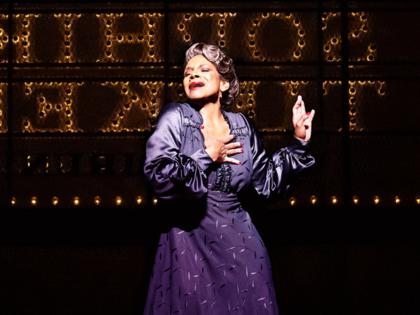Review: In 'Gypsy' on Broadway, Audra McDonald is transformational and tragically human as Rose
Published in Entertainment News
NEW YORK — Madam Rose is known for her powerhouse belt and for being the scariest Bad Showbiz Mother of the Year, but not for moving an audience to tears. Audra McDonald, surely the best actress ever to play this iconic role, changes that trajectory in director George C. Wolfe’s disarmingly moving Broadway revival of “Gypsy,” the 1959 masterpiece ostensible about the coming of age of Gypsy Rose Lee, with music by Jule Styne, lyrics by Stephen Sondheim and book by Arthur Laurents.
At the performance I saw, half the orchestra audience was wiping its eyes. Several times.
With apologies to Aristotle, the emotions here flow with force because some combination of Wolfe and McDonald has morphed our usual definitions of pity and fear into something closer to those necessary for the tragic condition. McDonald universalizes her pugnacious character so that we see our own failures in the ones she reveals, and our own missed opportunities in the unfolding of her fate. Wolfe puts McDonald in the middle of an unforgiving world, even within her own family, forcing the character to continually fight for her life, not least against her own self. She gets called a frontier woman without a frontier. Aren’t we all?
It won’t come as a surprise to Broadway regulars that McDonald’s work is strikingly empathetic, not least in how she sings the famous songs like “Everything’s Coming up Roses,” using far more of her so-called head voice than is typical. McDonald’s legit sound, closer to the opera house than the burlesque, suggests that Rose’s internalized fury has its genesis in a woman with real vocal talent, alas unappreciated.
But that’s not the whole story here. Joy Woods’ Louise gets ever more cynical and wound-tight as the show unfolds (there never was a less enthusiastic stripper) and thus you realize that the faux reconciliation after “Rose’s Turn” is mostly hollow, merely a sop to the Broadway audiences of 1959, for the past can never be undone. Laurents and Sondheim surely were making that point, even as they gritted their collective teeth and provided the requisite mother-and-daughter hug to send the punters out happily to the sidewalk.
The great thing about “Gypsy,” inarguably one of the top musicals of all time, is how well it reveals those signposts for directors to follow. Rose’s boyfriend Herbie, played with palpable pain by Danny Burstein, can put up with anything until he sees his lover ready to pimp out her own helpless daughter and sees that he never will be able to compete with her ego. And so he walks, just like Jordan Tyson’s clear-eyed June, the first to see that Rose is toxic.
McDonald and Wolfe keep you dancing delightfully on the edge of the show’s paradoxes, as choreographed here by Camille A. Brown. This “Gypsy” (playing across the street from “The Hills of California,” which could not have been written without it), is yet another reminder of the sacrifices show-folk make: the heartbreak, the likelihood of failure and the cruel passage of time for which aging humans are never well-prepared. On the other hand, these original creatives also show us why people make these choices, most notably in the aspirational “All I Need is the Girl,” beautifully performed here by Kevin Csolak’s Tulsa.
Wolfe could have made this a more explicitly Black “Gypsy,” had he wished. There were Black vaudeville and burlesque theaters with African American acts, a reality Chicago’s Porchlight Theatre used for its 2018 production. Thus there was no reason why all of Rose’s young people’s troupe, along with the strippers, could not have been made up entirely all-Black performers, even if some or all of the theater owners and powerbrokers were white, as was the reality in early 20th century American showbiz. As such, and especially with McDonald on the marquee, it could made have a powerful collective statement and I’d imagine it was discussed.
But in the end, Wolfe chose to foreground Black performers in the major roles while avoiding that kind of explicit commentary, using white adult performers for Tulsa and most of the rest of Rose’s crew. Thus even though issues of racial discrimination float in the air, they’re not explicitly explored through this production. Given the need for space between revivals and the presence of this megawatt star, that is perhaps an opportunity missed. In many ways, this actually is a traditional revival in terms of its design and staging, although Santo Loquasto’s set has some surprises. Most theatergoers will be just fine with that; “Gypsy” is such a masterpiece of construction that any deconstruction would feel like a violation.
That said, Wolfe has managed to make a major statement in that he has directed a “Gypsy” for everybody and has extended the show outwards from its initial context and milieu, much as one might take a King Lear or a Hamlet out of England or Denmark.
McDonald certain makes a good a case as anyone ever has for Rose qualifying as a tragic hero, and more power to both her and her director. And cheers, of course, to the ever-kinetic Rose. Like many of us, she knows that the moment she slows down, her end will come.
———
At the Majestic Theatre, 245 W. 44th St., New York; gypsybway.com.
———
©2024 Chicago Tribune. Visit chicagotribune.com. Distributed by Tribune Content Agency, LLC.













Comments